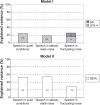Hearing aid fitting in older persons with hearing impairment: the influence of cognitive function, age, and hearing loss on hearing aid benefit
- PMID: 25709417
- PMCID: PMC4330028
- DOI: 10.2147/CIA.S77096
Hearing aid fitting in older persons with hearing impairment: the influence of cognitive function, age, and hearing loss on hearing aid benefit
Abstract
Purpose: To examine the association of cognitive function, age, and hearing loss with clinically assessed hearing aid benefit in older hearing-impaired persons.
Methods: Hearing aid benefit was assessed using objective measures regarding speech recognition in quiet and noisy environments as well as a subjective measure reflecting everyday situations captured using a standardized questionnaire. A broad range of general cognitive functions such as attention, memory, and intelligence were determined using different neuropsychological tests. Linear regression analyses were conducted with the outcome of the neuropsychological tests as well as age and hearing loss as independent variables and the benefit measures as dependent variables. Thirty experienced older hearing aid users with typical age-related hearing impairment participated.
Results: Most of the benefit measures revealed that the participants obtained significant improvement with their hearing aids. Regression models showed a significant relationship between a fluid intelligence measure and objective hearing aid benefit. When individual hearing thresholds were considered as an additional independent variable, hearing loss was the only significant contributor to the benefit models. Lower cognitive capacity - as determined by the fluid intelligence measure - was significantly associated with greater hearing loss. Subjective benefit could not be predicted by any of the variables considered.
Conclusion: The present study does not give evidence that hearing aid benefit is critically associated with cognitive function in experienced hearing aid users. However, it was found that lower fluid intelligence scores were related to higher hearing thresholds. Since greater hearing loss was associated with a greater objective benefit, these results strongly support the advice of using hearing aids regardless of age and cognitive function to counter hearing loss and the adverse effects of age-related hearing impairment. Still, individual cognitive capacity might be relevant for hearing aid benefit during an initial phase of hearing aid provision if acclimatization has not yet taken place.
Keywords: experience; fluid intelligence; working memory.
Figures

Similar articles
-
Dynamic relation between working memory capacity and speech recognition in noise during the first 6 months of hearing aid use.Trends Hear. 2014 Nov 23;18:2331216514558688. doi: 10.1177/2331216514558688. Trends Hear. 2014. PMID: 25421088 Free PMC article.
-
Auditory Distraction and Acclimatization to Hearing Aids.Ear Hear. 2017 Mar/Apr;38(2):174-183. doi: 10.1097/AUD.0000000000000366. Ear Hear. 2017. PMID: 27564230
-
Acclimatization to hearing aids.Ear Hear. 2014 Mar-Apr;35(2):203-12. doi: 10.1097/AUD.0b013e3182a8eda4. Ear Hear. 2014. PMID: 24351612
-
A systematic narrative synthesis of acute amplification-induced improvements in cognitive ability in hearing-impaired adults.Int J Audiol. 2019 Aug;58(8):455-463. doi: 10.1080/14992027.2019.1594414. Epub 2019 Apr 22. Int J Audiol. 2019. PMID: 31008660
-
Promoting hearing and cognitive health in audiologic rehabilitation for the well-being of older adults.Int J Audiol. 2024 Oct;63(10):761-771. doi: 10.1080/14992027.2023.2260099. Epub 2023 Oct 18. Int J Audiol. 2024. PMID: 37850919 Review.
Cited by
-
[Speech audiometry, speech perception and cognitive functions. German version].HNO. 2017 Mar;65(3):189-194. doi: 10.1007/s00106-016-0229-4. HNO. 2017. PMID: 27680543 Review. German.
-
Development of Chinese herbal medicine for sensorineural hearing loss.Acta Pharm Sin B. 2024 Feb;14(2):455-467. doi: 10.1016/j.apsb.2023.11.001. Epub 2023 Nov 4. Acta Pharm Sin B. 2024. PMID: 38322328 Free PMC article. Review.
-
Making the Case for Research on Disease-Modifying Treatments to Tackle Post-lingual Progressive Sensorineural Hearing Loss.Front Neurol. 2020 Apr 21;11:290. doi: 10.3389/fneur.2020.00290. eCollection 2020. Front Neurol. 2020. PMID: 32373054 Free PMC article.
-
Update on surgical and nonsurgical treatment options for age-related hearing loss.Z Gerontol Geriatr. 2023 Jul;56(4):276-282. doi: 10.1007/s00391-023-02182-3. Epub 2023 Apr 6. Z Gerontol Geriatr. 2023. PMID: 37022489 Review. English.
-
The Repeatable Battery for the Assessment of Neuropsychological Status for Hearing Impaired Individuals (RBANS-H) before and after Cochlear Implantation: A Protocol for a Prospective, Longitudinal Cohort Study.Front Neurosci. 2016 Nov 15;10:512. doi: 10.3389/fnins.2016.00512. eCollection 2016. Front Neurosci. 2016. PMID: 27895549 Free PMC article.
References
-
- Popelka MM, Cruickshanks KJ, Wiley TL, Tweed TS, Klein BE, Klein R. Low prevalence of hearing aid use among older adults with hearing loss: the Epidemiology of Hearing Loss study. J Am Geriatr Soc. 1998;46(9):1075–1078. - PubMed
-
- Davis A. Population study of the ability to benefit from amplification and the provision of a hearing aid in 55–74-year-old first-time hearing aid users. Int J Audiol. 2003;42(Suppl):2. S39–2S52. - PubMed
-
- Duijvestijn JA, Anteunis LJ, Hoek CJ, Van Den Brink RH, Chenault MN, Manni JJ. Help-seeking behaviour of hearing-impaired persons aged > or =55 years; effect of complaints, significant others and hearing aid image. Acta Otolaryngol. 2003;123(7):846–850. - PubMed
Publication types
MeSH terms
LinkOut - more resources
Full Text Sources
Medical

